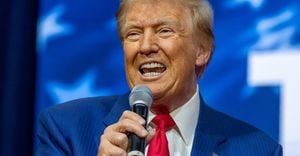Following one of the most contentious elections in recent American history, Donald Trump has emerged victorious, securing his place as president-elect for a second term. His campaign strategy, focusing on immigration and the economy, appears to have paid off, as he gained the support of previously skeptical demographics, including some traditionally left-leaning voters. Trump's first priority post-election was to appoint Susie Wiles, his loyal campaign manager, as his chief of staff, setting the tone for his administration's next chapter.
Meanwhile, Kamala Harris, the outgoing vice president, addressed her followers after conceding defeat, emphasizing the need for unity and acceptance of the electoral outcome. Harris's concession speech at Howard University revealed the emotional toll of the election on her supporters, many of whom expressed sorrow, reflecting on their hopes dashed by the results. "We must accept the result," she urged, but reaffirmed her commitment to continue fighting for progressive principles and policies.
On the broader political spectrum, the election results prompted swift reactions across the nation. Some states, particularly those known for their liberal policies, are making efforts to shield these policies from potential rollbacks by the incoming Trump administration—an initiative some are dubbing 'Trump-proofing.' This defensive posture highlights the urgency felt by many progressive activists eager to protect their hard-fought gains.
Commenting on his unexpected loss, historian and election forecaster Allan Lichtman reflected on the various factors contributing to the surprising outcomes of the election. Utilizing his renowned '13 keys' prediction model, which has successfully predicted elections since 1984, Lichtman’s recent failure highlights how cultural dynamics and the rampant spread of misinformation can significantly skew public perception and electoral outcomes. "I think the fundamental problem was the keys, not my interpretation," he stated, acknowledging the new and challenging trends he had not anticipated.
Among the societal reactions, notable voices within the entertainment industry expressed their discontent over Trump’s victory. For example, singer Olivia Rodrigo swiftly removed her popular song from TikTok after it was appropriated by Team Trump to celebrate their win. Rodrigo, who had previously endorsed Harris, demonstrated the emotional and social ramifications the election results brought to the younger generation, many of whom are now considering drastic life choices, such as relocating abroad.
Across the United States, specific communities shared firsthand perspectives on the factors influencing their votes. Many residents of border towns, who have personal stakes related to immigration issues, voiced their concerns over Harris's policies, aligning themselves more closely with Trump’s approach. Arnoldo Montiel, 80, reflected the sentiments of many locals by stating, "The border and foreign affairs" are pivotal issues driving his choice. His wife, Lupita, echoed these sentiments, criticizing the Biden administration's handling of immigration as "horrible," highlighting the very real fears some families face amid discussions of tougher immigration controls.
With tension high, Google reported dramatic spikes—over 1,000%—in search queries like "move to Canada" within 24 hours of the election, indicating widespread distress and the search for alternatives among those who feel threatened by Trump’s policies. Many Americans now face uncertainty about their future freedoms and rights, prompting discussions on international relocation akin to the sentiments expressed post-2016 election.
On the Democratic side, the party now faces tough questions about its direction moving forward. Some observers argue it's time for the Democrats to revert to their core values to reconnect with voters who feel abandoned. Political commentators are urging the party to recalibrate their message to appeal not just to those on the left but to wider demographics who feel disenfranchised by recent campaigns.
President Joe Biden, addressing the nation, emphasized the need to "bring down the political temperature," calling for calm amid the political storm following Trump's victory. His public statements reinforced the importance of maintaining trust in the electoral system, even as he acknowledged the challenges and uncertainties facing the country as it navigates Trump’s impending presidency.
Reflecting on the future, leaders like California Governor Gavin Newsom are preparing to safeguard their state's policies against any federal pushback from the forthcoming Trump administration. California’s efforts are aimed at protecting reproductive rights, climate initiatives, and other progressive stances likely to clash with Trump’s objectives.
Internationally, Donald Trump’s victory has garnered varied reactions, including from Russian President Vladimir Putin, who praised Trump as "a courageous man" and expressed readiness to discuss future relations. This endorsement underlines the geopolitical stakes of the election, as global leaders anticipate the potential shift under Trump’s renewed leadership.
Beyond the immediate political shifts, cultural and societal dialogues continue to evolve as the nation grapples with the outcomes of the 2024 election. Local communities, national leaders, and global figures alike are watching closely, as the next moves from both Trump and the Democratic Party may significantly shape the future political and cultural landscapes of America.
The election has not only claimed its contestants but also sparked renewed discussions about the direction of the country, with many Americans now facing existential questions about belonging, representation, and the power of their voices.



